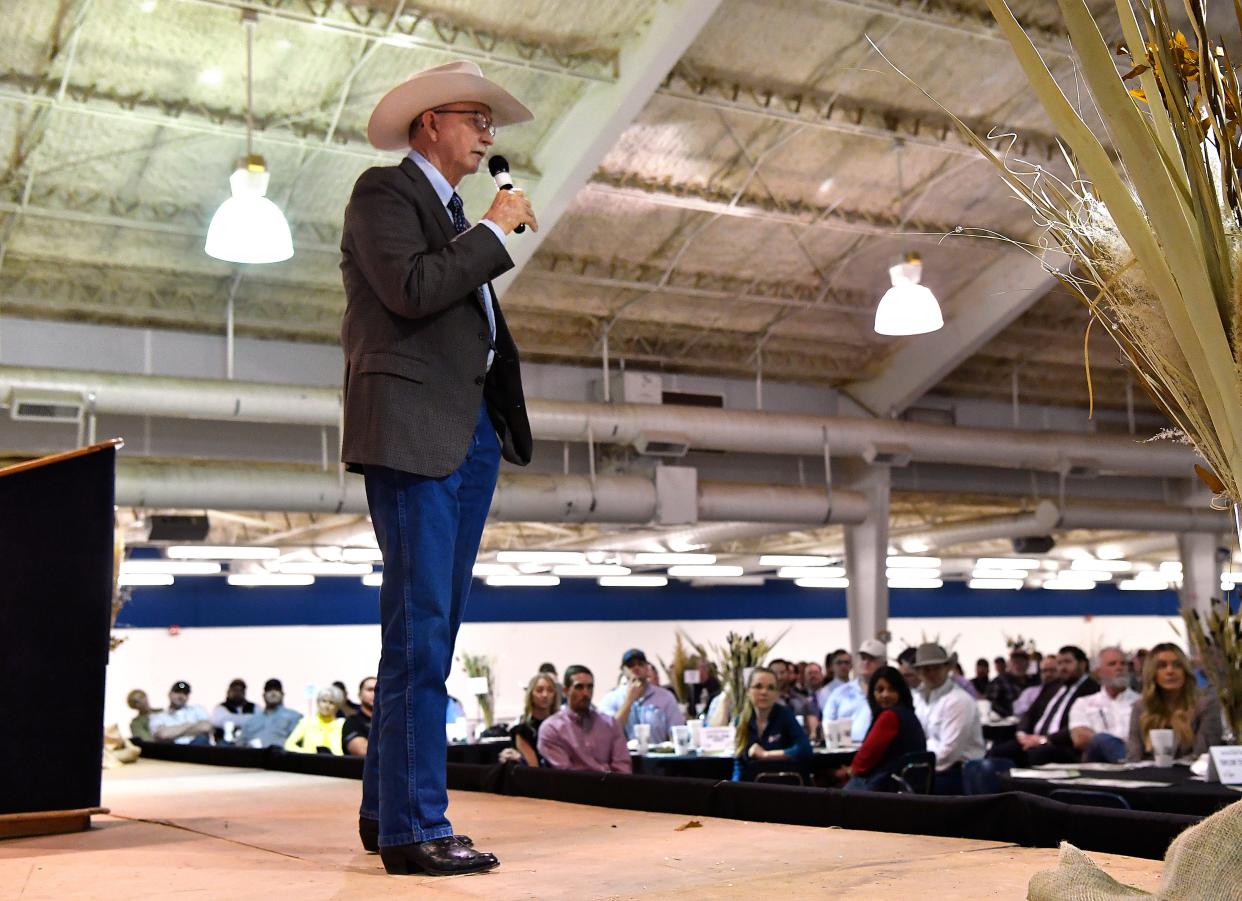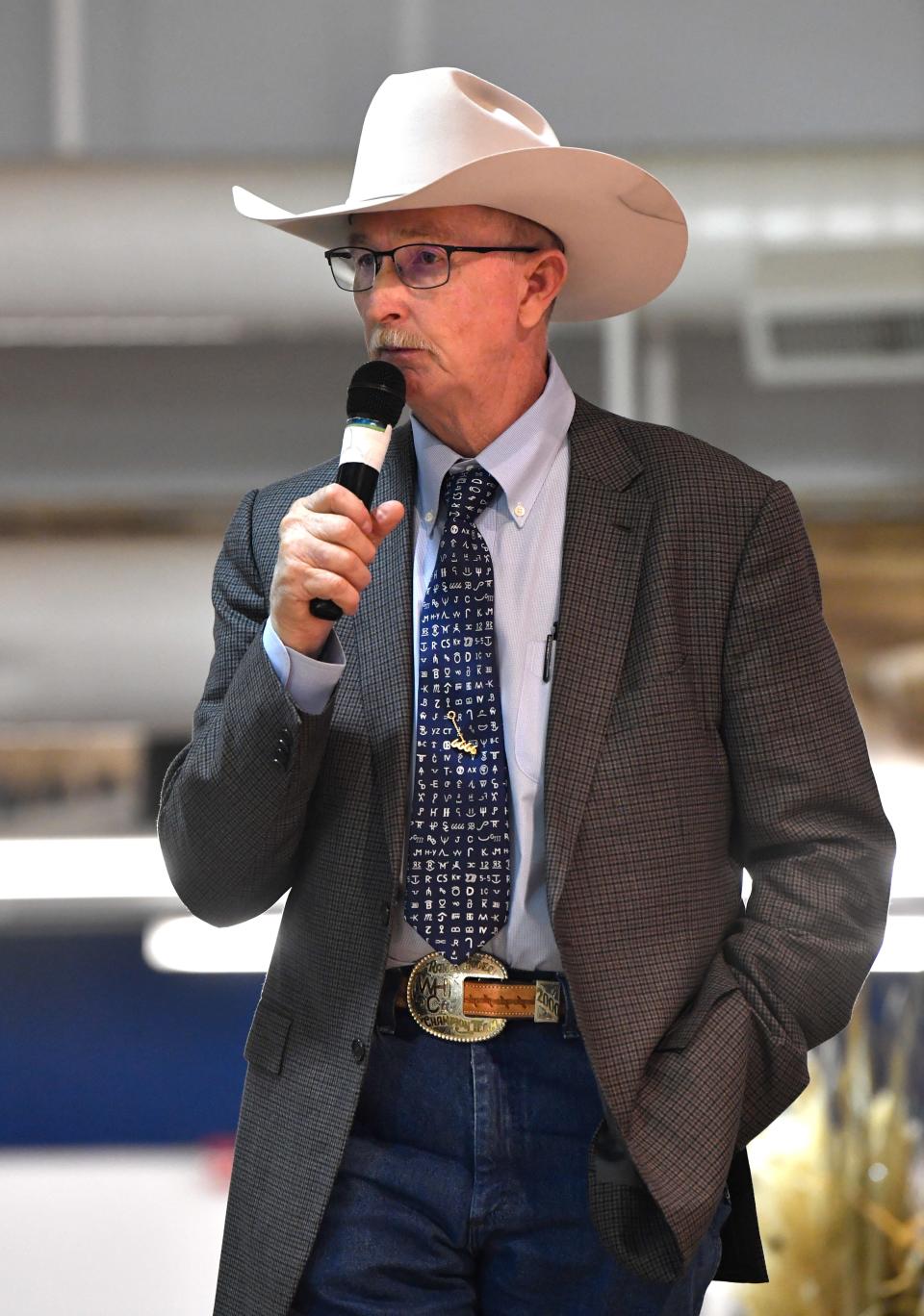6666 Ranch GM talks up ag and shares a few Taylor Sheridan stories

- Oops!Something went wrong.Please try again later.
Joe Leathers knew the elephant in the room.
A bull, more likely, though Joe's not one to BS.
As the general manager of the famed 6666 Ranch since 2008, he knew those attending Wednesday's Agriculture Legacy Luncheon on the windy second day of the annual Texas Farm-Ranch-Wildlife Expo wanted insider info about "Yellowstone."
"I'm sure you know that the ranch sold a couple of years ago to Taylor Sheridan and the 'Yellowstone' bunch,," he said, apologizing for sounding a lot like Jed Clampett and looking a bit like Slim Pickens.
No, he said, he never has met star Kevin Costner.
No, the ranch isn't owned by the Chinese.
Now, before I go on, put that on "YouTwitFace" (his mashup of YouTube, Twitter and Facebook).
"Y'all can put that on social media and we can get that out of the way," he said, to laughter.
Leathers, who has worked at the ranch for 23 years, circled back to the 6666 and recent developments. But he primarily patted the backs of those in agriculture.
He congratulated Taylor County farmer Christopher Hart and his family, who were honored minutes before as this year's Farm Family of the Year.
"I am extremely pleased to see this young family that is not only engaged in agriculture but thriving. That's what we lack in our industry. Young people coming up," Leathers said.
He said people tend to look at the Four Sixes and credit its success to its size. But if the ranch operates like any other ranch - its challenges are just the same as those of a small operation.
"I have a real understanding of what it takes," he said.
Sustainability?
"Why in the world would we come up with a sustainability program when it's not anything more than what we've been doing? We lead the world today in sustainability," he said.
"They're going to have to catch up to what we've already done. We take it from birth to plate."
Yes, the 6666 has its history.
"But every one of us in this room has a history," he said.
Leathers then talked about some of that history.
Ag vs. government
The Four Sixes changed ownership in 2022, when actor-screenwriter-director Sheridan, co-creator of the popular cable show "Yellowstone" and its two prequels, purchased the entire 266,000-plus-acre operation.
The ranch went up for sale after Anne Burnett Windfohr Marion died in 2020 on the 150th anniversary of the ranch. She was the great-granddaughter of Capt. Samuel "Burk" Burnett, who founded the ranch in 1870.
Remarkable, Leathers said, because that was just five years after the Civil War.
"He was a man of vision," he said. "That was pretty much the beginning of the cattle industry."

Burnett had to deal with politicians back then, and cattlemen deal with them now.
"I have spent countless hours and days in Washington, D.C., and Austin, Texas, lobbying and fighting for the cattle industry and agriculture," he said. "It hasn't changed
"There are always going to be issues that we deal with politically," he said.
But now, the ranch - and the power it wielded on behalf of agriculture - was going up for sale.
The main ranch totals more than 142,000 acres and is located near Guthrie - 96 miles northwest of Abilene, 94 miles east of Lubbock and 116 miles mostly west of Wichita Falls. It covers a rural part of Texas that a writer once called "The Big Empty."
Burkburnett, which is just north of Wichita Falls, is named for Burnett - a name chosen by President Theodore Roosevelt after making a hunting visit to the area and meeting the wealthy rancher.
There was more than land going up for sale. There was history.
The sale goes down
Sheridan, Leathers said, was the sixth potential buyer to come to the ranch and embark on the three-day tour it takes to see it all.
A buyer, in Leather's mind, had to have deep pockets and the wherewithal to run the operation - the entire operation.
"How many people do you know that have those two things?" he asked.
The first five outfits didn't pass muster with Leathers. When he asked each about 30 minutes in about their vision, he found out they had none.
"Ranching 101 will not make you a living," Leather said. "It's dadgum hard. Why do we do it? Because we're called to it."
Sheridan had called about the 6666 before Marion died and wanted to film for "Yellowstone" at the ranch.
"I got to be honest with you, I didn't know who Taylor Sheridan was," Leathers said. "And I did not care.
"He came, and I told him that I could see a whole lot more downside than upside, Why would I jeopardize the reputation of the ranch just to be on TV?"
Leathers got up and walked out.
"Lo and behold, I work for the guy now," Leathers said, to laughter. "I have not seen a show of 'Yellowstone' to this day."
Sheridan then expressed interest in purchasing the ranch. It was going for north of $320 million. He was only $300,000 million short.
"The guy put together enough investors he got it done," Leather said.
Sheridan came for the tour and Leathers asked him about his vision.
"He didn't bat an eye or take a breath," Leather said.
He wanted to take it to the next level, he said.
How so, pod'nah?
• We need a direct-to-consumer product.• The horse side needs to be upgraded.• Operations need to be streamlined.• The history of the 6666 needs to be marketed.
That was exactly what Burk Burnett's granddaughter and Leathers had talked about.
"She wanted us to be on the cutting edge, to be the leaders in the industry, to the lay the groundwork and the foundation of what it will look like in the future," he said.
Sheridan's purchase got Leathers' blessing.
"I though that was a God-thing," he said. "That's what we're doing today."
Speaking up for the ag industry
Leathers returned to his challenge to his audience, a mix of ag folks and city slickers.
"Who in this room is going to step up to the plate? We need a seat at the table for the future of our industry for our children and our grandchildren," he said.
Leathers decided years ago that he would be part of the solution rather than be the fella "who sits in the coffee shop and just complains.
"I figured if I could talk in a coffee shop, I could talk in front of some congressmans and senators as well. And so, that's what I have done."
He paused. But not without the support of his wife of 45 years, Louise.
That drew applause.
He defined agriculture as the "art of losing money, working 400 hours a month for people who think we're trying to kill 'em," he said. Death by red meat.
"That's sad but it's true," he said. All due to a "niche group of people who scream and whine like a bunch of team ropers."
To be the best, he said, takes money. It takes money to get carcass data to improve beef quality for the consumer.It takes caring for your employees and the nearby town and school when drought hit in 2011.
"There was no grass and no water," he recalled. "I felt a great weight on my shoulders to do the right thing."Leathers said that instead of selling off, as many did in the drought of the 1950s, he and Marion, on her urging, bit the bullet and moved herds to nine different ranches in five states until Texas battled back.
That kept 100 years of genetics in the 6666.
"You don't get those back," he said. "It takes generations to get to where we were at. We not only held them together, we improved them" over the next eight years.
It was back to talking bout the direct-to-consumer program, which basically eliminates the middle man. It has been addressed on "Yellowstone."
While Leathers knows his fair share about a lot of things, he said cattle going to a packing house "is like a guy form the Texas Panhandle going to ocean into shark-infested water to swim.
"You better get educated or you're going to get an education."
Before they could move forward, Marion was diagnosed with cancer, and that plan was put on hold again.
It was Sheridan who brought it back to the foreground.
In December, the first direct-to-consumer deal was done.
You can do it, too
People again will say the Four Sixes can do all this because it's the Four Sixes. It has a history.
To that, Leathers points out the third- and fourth- and fifth-generation ranchers he comes across.
"We all have a history," he said Wednesday.
He looked at the Harts sitting as a family near the front.
The challenge is educating the public of "who we are, what we do and why we do it. We should never apologize for what we've done."
Taylor Sheridan, he said, has put a light on ranching with his shows.
"Is it accurate? No," Leathers said. Sheridan wants to highlight the problems "but put enough sugar on the cookie for people to watch it. And that's pretty much what he's done."
Drama aside, the problems of public land vs. private land, encroachment of cities, airports and golf courses, and hunters, "all that is true," he said.
The 6666 now has a big neon sign shining on it, he said.
The ranch needs to capitalize without losing its reputation.
"But folks in the agriculture industry, especially ranching and the cattle and horse industry, listen to me. It's put a highlight on your ranches.
"What are you going to do with it?
This article originally appeared on Abilene Reporter-News: 6666 Ranch GM talks up ag and shares a few Taylor Sheridan stories

